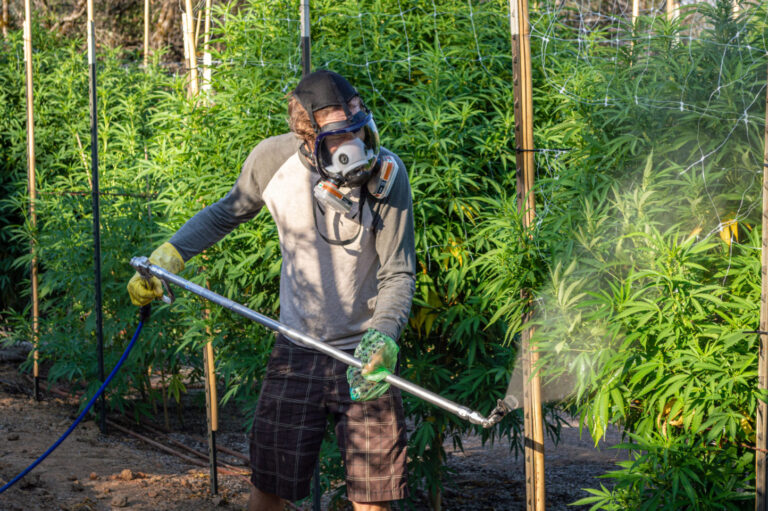The Nevada Cannabis Compliance Board (CCB) recently issued a public health and safety bulletin on Jan. 19 regarding the use of an unapproved pesticide. “The CCB was notified that the following cannabis and cannabis products had been treated with an unapproved pesticide, Ethephon, at Clark Natural Medicinal Solutions, LLC,” the CCB explained in its bulletin.
Currently, there are no illnesses reported, according to the bulletin.
The pesticide was applied sometime between July 23, 2021 and Jan. 5, 2023, and the CCB instructs consumers to check the labels of the cannabis they purchased (which includes flower, shake or trim, and pre-rolls). “All cannabis products properly sold by a licensed cannabis sales facility should have a product label on the packaging,” the CCB wrote. “The name of the cultivation facility which grew the cannabis and the harvest date can be found on the label, typically near the top.”
The CCB also put together a list of products that may have been affected by the pesticide, including more than 117 edibles, 41 infused pre-rolls, and more than 200 concentrates, sold at 104 dispensaries.
According to the U.S. Environmental Protection Agency, Ethephon was discovered in 1965 and registered as a pesticide in 1973. “Ethephon is a plant growth regulator used to promote fruit ripening, abscission, flower induction, and other responses,” the EPA states. “Ethephon is registered for use on a number of food, feed and nonfood crops, greenhouse nursery stock, and outdoor residential ornamental plants, but is used primarily on cotton. Formulations include formulation intermediates and soluble concentrates/liquids.”
The EPA also states that Ethephon can potentially cause severe skin and eye irritation “but otherwise is “moderately acutely toxic.”
The CCB also stated that testing facilities do not currently test for Ethephon specifically. “There is no reason to believe the cannabis sales facilities or cannabis testing facilities had any knowledge of the use of this unapproved pesticide; Ethephon is not on the list of pesticides the testing facilities must look for, and their test methods are not set up for detection of Ethephon.”
According to the Nevada Department of Agriculture, updated as of August 2022, there are 86 pesticides that are not legally prohibited to be used on cannabis plants. This varies from minimum risk ingredients such as cinnamon, garlic oil, or zinc metal strips to registered pesticides, such as myclobutanil, where “tolerance is monitored.”
Previously, the CCB has only issued a few safety bulletins such as this one. One bulletin was issued in 2020, which addressed failed microbial testing. Three were issued in 2021, involving more failed microbial testing, incorrect THC potency testing, and products that were unable to be verified as tested. Two bulletins were issued in 2022, pertaining to unverifiable testing and mislabeled products.
In addition to these bulletins, the CCB awarded the final licenses for consumption lounges in Nevada in December 2022, half of which were designated for social equity applicants. Funding for consumption lounges were initially approved in August 2021, with regulations approved by legislators in June 2022, such as safety protocols, staff training, and location restrictions. Now, consumption lounges are “likely to open before Summer 2023,” states the CCB.
One judge issued a ruling last year asking that cannabis be removed from the Schedule 1 category of the Controlled Substances Act. In September 2022, Judge Joe Hardy ordered the Nevada Board of Pharmacy to remove cannabis from its current schedule designation, because cannabis has been recognized in the Nevada constitution as having medical value. “The constitutional right to use marijuana upon the advice of a physician does establish that marijuana has an accepted medical use and treatment in the United States,” said Hardy.
